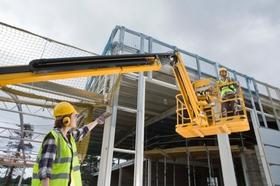Despite a decline in the nation’s gross domestic product (GDP) in the last quarter of 2012, the Bureau of Economic Analysis Jan. 30 reported nonresidential fixed investment increased 8.4 percent for the fourth quarter as investment in equipment and software jumped 12.4 percent, which outweighed a 1.1 percent decline in investment in structures.
For the year, nonresidential fixed investment increased 7.7 percent, with investment in structures up 9.6 percent and investment in equipment and software up 6.9 percent. Residential fixed investment increased 15.3 percent in the fourth quarter following a 13.5 percent increase in the third quarter. Annually, residential fixed investment increased 11.9 percent over 2011.
Real gross domestic product decreased 0.1 percent, at a seasonally adjusted annual rate, in the fourth quarter ending a growth streak for the U.S. economy that spanned 13 quarters. Annual economic growth tallied 2.2 percent in 2012 following a 1.8 percent annual increase in 2011. Much of the quarterly economic decline was attributable to a change in real private inventories, a decrease in government consumption expenditures, down 6.6 percent, as well as sales abroad with exports down 5.7 percent.
“Fourth quarter GDP is not only disappointing, it reveals how much damage was done to the economy by the ongoing slowing of much of the balance of the global economy and fiscal cliff fears,” said Associated Builders and Contractors Chief Economist Anirban Basu.
“Much of the economic momentum generated during the initial nine months of the year dissipated during the fourth quarter as investors, business decision-makers, consumers and others paused in anticipation of a resolution to fiscal issues such as automatic sequestration, the scheduled expiration of the Bush tax cuts and the fate of the payroll tax cut,” Basu said.
Federal government spending fell 15.0 percent in the fourth quarter following a 9.5 percent increase in the third quarter. National defense spending dropped 22.2 percent following a 12.9 percent jump in the third quarter. State and local government spending slipped 0.7 percent in the fourth quarter following a 0.3 percent increase in the previous quarter.
Real final sales of domestic product—GDP less change in private inventories—increased 1.1 percent for the quarter following a revised 2.4 percent increase in the third quarter. Gross domestic purchases – purchases by U.S. residents of goods and services wherever produced—increased 0.1 percent in fourth quarter following an increase of 2.6 percent in the third quarter.
“While some of this uncertainty is behind us, confidence among key economic decision-makers continues to be compromised by impending federal spending cuts associated with automatic sequestration, a scheduled end to the federal budget continuing resolution in late March, and debt ceiling discussions to take place later this year,” remarked Basu. “For construction contractors and others, this means that the first several months of 2013 will remain too soft to produce an environment consistent with more robust nonresidential construction recovery.
“Based on the clues supplied in today’s GDP release, construction industry stakeholders can expect construction spending data to also reflect ongoing weakness in momentum,” said Basu. Stakeholders also can expect plentiful discussion in the days to come regarding whether or not last year’s fourth quarter represents the beginning of the next economic downturn.” Read More.


